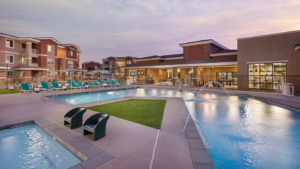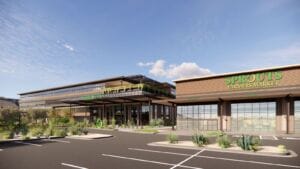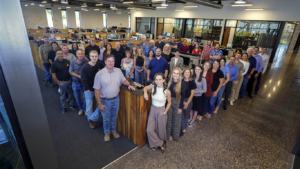How does someone go from working in a Texas prison to a thriving career in commercial real estate? John Orsak, senior vice president, LPC Desert West, Lincoln Property Company can tell you! Because before this property management dynamo was managing properties across the Southwest, the Texas native was … yes, working full-time as a prison guard. His former employment path even placed him in a position to be interviewed by Ted Koppel on an episode of Nightline.
LEARN MORE: LPC breaks ground on massive $515 million Luke Field in West Valley
“I can’t find the footage anywhere,” Orsak says of his stint on TV. “Allegedly there’s a VHS tape that my ex-roommate has from a long time ago.”
The footage, it seems, remains in the distant past with Orsak’s time in correctional law enforcement, which never really was the direction he had intended to pursue anyway. But as a young 20-something, what Orsak clearly did have was the drive and determination that’s evident in his present career in commercial real estate.
“I would take the Sunday Chronicle — the Houston Chronicle at the time — and I would literally circle the [job] ads,” he says. “I remember laying on the living room floor with a marker and marking up and circling ads and just faxing my resume.”
Many faxes and one recruiter later, Orsak landed a job with Heinz. And on that first job, Orsak’s security background ended up coming in handy.
“Within a month of me starting there, I pulled off a drill where we did a full building evacuation of a 50-story high rise in downtown Houston,” he says. “That was my first project. I ended up with Hines for about 13 years and moved my way up into project management and development.”
More than two decades later, Orsak says he “literally touches every aspect of the business,” at LPC, “from property management to leasing, to development through project management, acquisitions, disposition and more.”
One arena in which Orsak has delved into in more recent years has been “creative industrial” development. This niche of the market is one that he explains was largely initiated by LPC as they began to see a greater demand for amenity- and technology-driven spaces.
“Industrial buildings used to be called industrial buildings because that’s really what they were,” he explains. “It was manufacturing, it was forklifts and it was pallets and racks — everything [in industrial development] has morphed substantially from what it used to be to now.”
Today, creative industrial projects are what Orsak describes as logistics-focused buildings. “They’re distribution buildings and they’re hubs and they’re way more sophisticated than what they were before.”
As a result, creative industrial projects have become what Orsak says are “creative spaces made specifically for the employee, not only to enhance their experience at work every day, but for the occupiers of the space to be able to recruit and retain employees.”
Adds Orsak of a recent Walmart industrial build, “We have barbecue gas grills out there, we have picnic tables, we have shade and turf. It’s a great spot to land for a lunch break.”
As for what comes next for Orsak, looking to the next year, five years, 10 years, he’s excited to continue his journey with LPC. “My goal is to grow the business within our markets and growing that means also diversifying our line of business,” he says.
Orsak also hopes to continue growing and refining his philanthropic project, “Santa’s Sack,” that he started 13 years ago.
“We probably put gifts in the hands of several hundred kids,” he says. “We made over a hundred homeless care kits that we partner with a church that really caters to the homeless community. My goal is to grow it and to make it into its own entity.”




